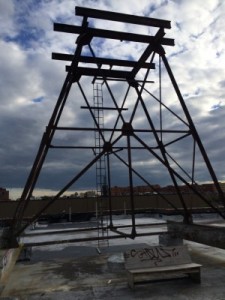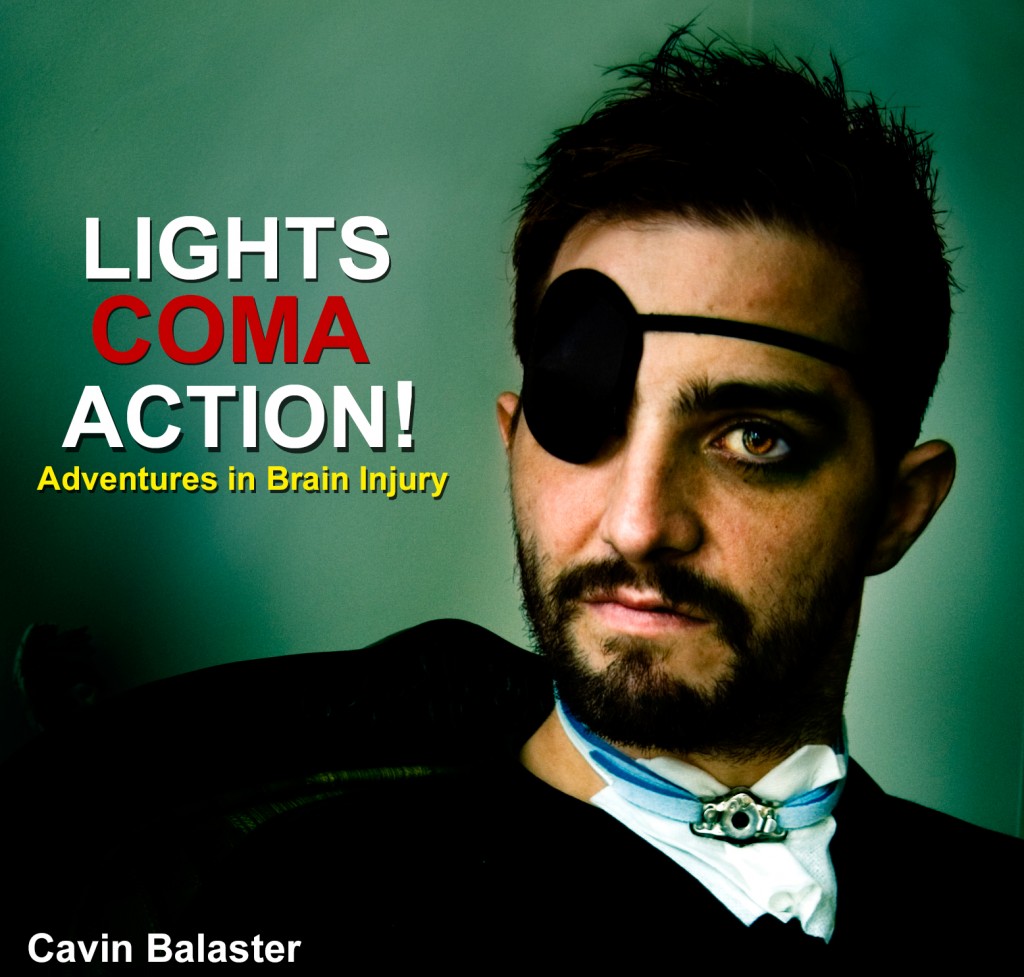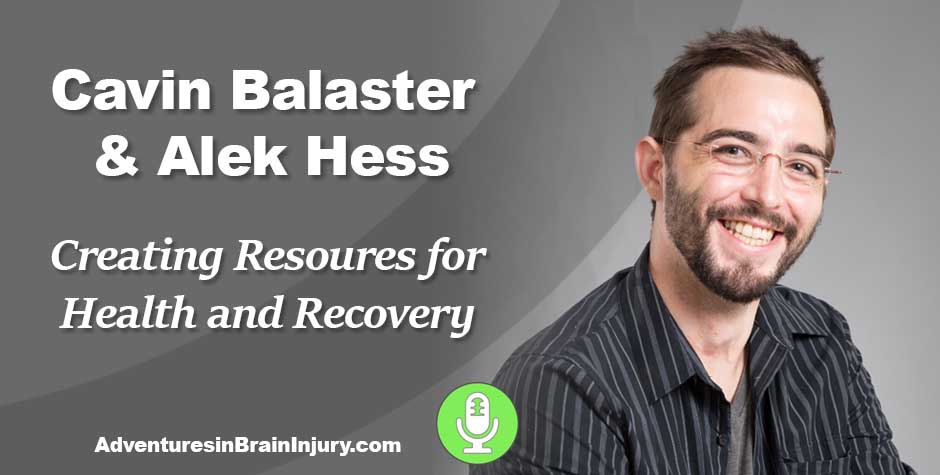Cavin Balaster, our December Teach Believe Inspire award winner, is a true renaissance man who has devoted his talents to solving the puzzle of brain injury in new ways. We were able to speak in more depth with him this month about the details of his recovery from TBI, his current research into nutrition therapy, and his upcoming memoir (due out in 2017).
For more information about Cavin, you can subscribe to his podcast “Adventures in Brain Injury” on iTunes, access his free eBook (available on his website) or visit his .
 Do you remember feeling any misgiving or fear when you climbed up the side of the water tower that night in 2011?
Do you remember feeling any misgiving or fear when you climbed up the side of the water tower that night in 2011?
I actually have no recollection of climbing the water tower. In fact, I do not remember a single moment of this entire day, or about a month following my fall. I wish that I could tell you what thoughts went through my mind. Perhaps I was scared. Perhaps my life flashed before my eyes as I crashed from one steel beam to the next. But the truth is, I do not remember a thing.
The most defining moment of my life has been wiped away, and I am really only able to tell this part of my story based on information that has been relayed to me by others.
During your first months of therapy, what made the biggest difference in helping you toward recovery?
This is a great question, and one that I get a lot. There were several aspects of my recovery that I didn’t expect would make such a positive impact. In fact, I’m in the process of writing an eBook about this very subject.
I had incredible social support, which makes a world of difference no matter what we’re going through. And of course, I am very thankful that I was fortunate enough to receive the initial treatments and surgeries that saved my life.
Honestly, nutrition probably played the biggest role in my recovery. I had been in a brain fog throughout much of my recovery and was very emaciated and underweight. Not only was I relearning to talk, walk, and eat again, I was also healing and rewiring my brain. I was putting serious work into repairing my body and learning to adapt, and I couldn’t progress without making sure I was adequately fueling all that work.
Had you written much before your injury?
I had not done a tremendous amount of writing before my injury, but I’ve been a songwriter and musician all of my life. I was a bartender in NYC for years, and storytelling is a forte of any good bartender. The craft of songwriting and storytelling is about conveying a feeling, and that is what I try to do in my writing.
Were there any writers who inspired you, as you began to document your story?
When it came to documenting my story, I was most inspired by Viktor Frankl. Frankl was a Holocaust survivor who went through some of the most horrific experiences imaginable before wring his best-selling book titled Man’s Search for Meaning. He was also a psychologist, and, in his book, he really explores the human psyche surrounding suffering vs. despair. The gist of his writing brought me to an important conclusion: when life feels meaningless… Give it some meaning. Or as Michael J. Fox says “If life deals you a bag of hammers, build something.”
When you began posting on your blog, were you hopeful of connecting with other people? Or did you just want a place to store your work?
When I first began writing my blog, I wanted to better document, to understand what it was that I was going through, and to give it all meaning. As I continued writing, it became clear that what I was doing not only helped me to process all that I was going through, but other survivors, practitioners, and caregivers expressed an appreciation for my writing as well. The messages I received in response to some of my posts solidified a need for this kind of work, and so I continued on to create better resources for practitioners, survivors, and their loved ones.
Now, as a public speaker and with my website, podcast, eBooks, and a hardcopy book on the way, I’m more dedicated to helping others than ever, and I’ve only just begun!
Were you surprised to find that your blog resonated with so many followers?
Every brain is unique, as is every brain injury. A fact which may contribute to why so many survivors report feeling misunderstood and marginalized – there is a lot of symptom variability and it’s hard for anyone to know what to expect.
Though my story is uniquely mine, I think the extremes of my recovery – from near death, through the multi-year journey, to becoming an outspoken activist – lend a sense of hope to anyone having to go through difficult and trying circumstances. And hope is a big deal.
I was comatose (twice), lost coordination with the left side of my body, intubated, heavily medicated, fed through a PEG tube, had to relearn to walk, talk, eat, and think clearly, became intensely focused on nutrition, and I’ve developed an extensive relationship with vision therapy. I think the number of complications, symptoms, and treatments I’ve gone through makes my story available to many different people.
In a way, my story holds something for anyone…and I sincerely hope my story lends something to everyone.
 How are you adapting your story into book form with your upcoming memoir Lights, Coma, Action!
How are you adapting your story into book form with your upcoming memoir Lights, Coma, Action!
“Lights, Coma, Action!” will not only be a reflection of the events leading up to my accident (Lights) and the details throughout my recovery journey (Coma), but the “Action” portion is a broader focus on the work I’ve been doing in the health, education, neurology, and TBI community since. My hope is to not only create an inspiring story with a much more heartfelt picture of the trials that my friends, my family, and I have faced throughout, but also for the book to act as a resource for practitioners, survivors, and their loved ones.
How did it feel to play your first post-TBI musical show at South by Southwest 2013?
It was incredible. After my accident, I was unable to walk, talk, or eat for months, and my left wrist was entirely flexed inward (spastic hypertonia). Music was a tremendous facilitator and motivation for my recovery: as soon as I could hold the guitar I tried to play, and as soon as I could talk, I tried to sing. Not only had I recovered my ability to stand, walk, and to hold a guitar, but I was relearning to sing and to PLAY the guitar again!
A lot of people came out in support and I got to share my story with the audience and to play several original songs which I had worked to adapt to my newly diminished abilities. I started the set with a song I actually wrote a year before my brain injury called “Someone Take Me to a Doctor.” We use this song to intro and close each episode of the Adventures in Brain Injury Podcast.
It was a huge personal achievement and it felt like the months of work I had put in to relearning to play really payed off.
Can you tell us more about your nutrition-based approach to brain injury therapy? What are the main principles? Is it controversial at all? Are there studies that other people can read about?
My approach is really quite simple: Nutrition is the foundation for a strong recovery. None of this information is controversial. But because of factors like the nature of triage, budget, limited time, bio-diversity, and liability etc… It’s just never really given much light during treatment. And while we all have unique bodies – and beliefs about what to put in them – I like to focus on basic unifying principles.
I think of rebuilding the neuronal connections that have been damaged like building a bridge: nutrition acts as materials like lumber, and therapy and exercises are like workers. You can have all the skilled workers and engineers in the world, but if you don’t supply the adequate resources to build that bridge, it’s not going to happen.
Survivors are not unlike body-builders in some ways: we are constantly working to strengthen and repair our bodies and brains. As I mentioned previously, not only was I in a serious brain fog throughout much of my recovery, I was also very emaciated and underweight, while trying to relearn to talk, walk, and eat, and heal my brain all at the same time. “Exhausting” doesn’t begin to describe it.
After leaving the acute stages, it was discovered that I wasn’t getting adequate nutrients – including vital fats and proteins – despite eating a lot of protein-rich foods. I was not absorbing the protein that I was eating and the intensely difficult work I was doing to heal my brain was not being supported. This isn’t uncommon, and it lead to an epiphany:
We aren’t what we eat, we are what we can absorb.
You have probably heard of Leaky Gut Syndrome? What you probably have not yet heard is that Leaky Gut is a condition known to be common with brain injuries and brain disease, as well as being very common with people who have been hospitalized and put on multiple medications and antibiotics (and I had endured all of that!).
By healing my gut, I was able to bring down the inflammation and to adequately support the cellular makeup of my brain and body. It was only after I worked to solve this problem and was finally receiving adequate nutrition that I started to come out of the brain fog I had been in for so long. I began to see real progress in both my cognitive and physical abilities. And I’ve spoken with and gotten to know survivors of many different, life-threatening conditions who have found success in a similar way.
I’ve written more about this on my website, and I have a resources page which includes information, supplements, and programs specific to digestive health and recovery – with an eBook on the way!
What is on the horizon for you, besides the 2017 release of your book?
My goal, as always, is simply to help and support others, no matter what role they play or what they may be going through. It has been a real joy to work one-on-one with several survivors and their families over the years, and it’s the kind of work I’m meant to be doing.
We are extremely pleased about the response our podcast is receiving so far, and I’m passionate about finding support to ensure that we can do this more regularly. We get mail daily from all kinds of people thanking us for speaking for them, or for an informative interview we’ve done, etc… We’re just starting out and we have an exciting lineup of guests and topics coming in the following months. Our reach is growing day by day, and I’m hopeful that we will find a sponsor who will see the value in supporting a show that provides resources and information and acts as an outlet for many survivors, caregivers, scientists, and practitioners. This would really allow us to provide these kinds of resources more often.



